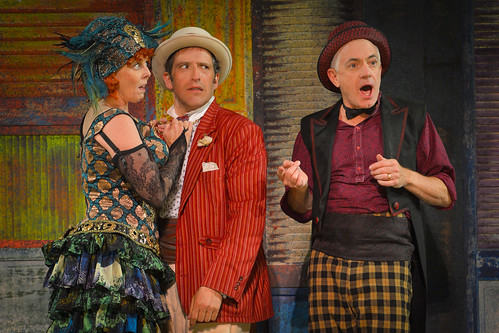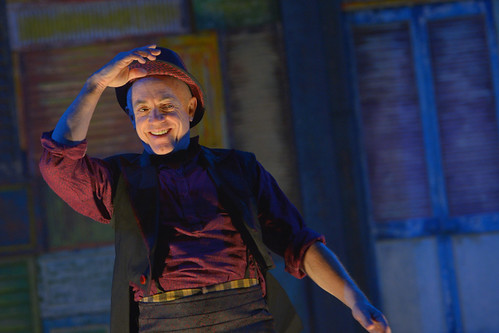
Patty Gallagher (left) is the Courtesan, Adrian Danzig (center) is Antipholus and Danny Scheie is Dromio in the California Shakespeare Theater production of The Comedy of Errors. Below: Scheie steals the show as both Dromio twins. Photos by Kevin Berne
A visiting stranger makes a keen observation: “Your town is troubled with unruly boys.” The trouble is, he ends up being one of the unruly boys, and that’s the fun of Shakespeare’s The Comedy of Errors, a masterfully chaotic comedy now at California Shakespeare Theater’s Bruns Amphitheater.
As farces go, this Comedy requires us to believe that two sets of not-so-bright twins with the same names – the upper-class set is called Antipholus, the slave set is called Dromio – cause confusion, consternation and furious frustration when roaming the streets of Ephesus of the same day. Once over that hump (and Shakespeare makes it pretty easy), the farce clicks along like a finely tuned laugh machine until brothers are reunited, a father’s search is fulfilled and a courtesan gets her diamond ring back.
Director Aaron Posner strikes the right tone from the start as he has his troupe of seven actors deliver the pre-show speech about de-noising electronic devices and the traditional all-praise of Peet’s Coffee and Tea. There’s a lively informality to the proceedings that allows his loosey-goosey production to deliver an abundance of Shakespeare’s laughs and plenty devised by director and actors.
There’s a cartoonish feel to the proceedings, from the whimsical sound effects (by Andre Pluess) to the graceful arches and busy wooden-plank-heavy platforms of Nina Ball’s brightly colored set. But the zaniness is never so broad it becomes frayed and unfunny, and that’s thanks to a septet of actors that essays multiple roles with gusto.
This is especially true in the case of Adrian Danzig playing both Antipholus twins and Danny Scheie as the Dromio twins. Many believe that Shakespeare originally intended that one actor play each set of twins, which makes for a double tour de force for a set of fine comic actors.
Danzig and Scheie are more than up to the challenge, with Danzig playing more of the straight role (still with cartwheels and a fantastic seduction of Tristan Cunningham as Luciana), making Antipholus of Ephesus kind of a thug and Anitpholus of Syracuse sweeter and more prone to naiveté. Scheie, a Cal Shakes favorite for good reason, all but steals the show as the Dromios. His nimble, high-energy performance gives us an abrasive Dromio of Ephesus and a dimwitted Dromio of Syracuse. With a Wonder Woman spin and a tilt of his hat, Scheie spends one scene being both twins, one on either side of a closed gate, and it’s so exciting you’d like to stop the show and ask him to do it again – stunt comedy at its finest.
Scheie might be described as a ham if he weren’t so incisive in his creation of distinct characters, mining the dialogue for each zinger and laugh. Dromio of Syracuse’s reaction to Nell, the large, greasy cook provides one of the evening’s best and most prolonged laughs, just as Dromio’s frequent cri de coeur, “Oh, for God’s sake!” just gets funnier each time.
There would be plenty to love about this Comedy with just Danzig and Scheie doing their twin thing, but the support they get from their fellow actors makes this zippy evening (not even two hours) all the more enjoyable. Ron Campbell and Liam Vincent play multiple roles (Vincent’s deadpan way with a punch line is priceless), and at one point near the end of the show, they realize the plot requires them to assume characters seen previously with no time or opportunity to change costumes. So clothing racks appear miraculously from backstage and the actors change in full view (and much to the delight) of the audience.
Patty Gallagher does a marvelous striptease without taking of any clothing as the Courtesan (all to a recording of her lines) and then moments later is in full nun regalia as an Abbess sporting a giant, pain-inflicting ruler.
In addition to her tantalizing tango with Danzig (choreographed by Erika Chong Shuch), Cunningham charms as Luciana, a little sister who doesn’t know what to do when her older sister’s husband (or so she thinks) falls madly and instantly in love with her. And then there’s Nemuna Ceesay, fresh from her wonderful turn in Cal Shakes’ A Raisin in the Sun, as Adriana, a wife who is done with her husband’s shenanigans. I’ll always remember Ceesay’s performance fondly, not simply because she’s such a force on stage, but because in one of her forays into the audience on opening night, she interacted with male members of the audience and planted a big ol’ lipsticky kiss on my lips. As if the balmy June night wasn’t already warm enough, here’s a good example, kids, of how live theater can do things movies and TV never, ever could.
There’s so much good will and sheer enjoyment built up in this Comedy that by the ending, when the two sets of twins are required to share the stage at the same time, the audience quite happily plays along as Danzig and Scheie jump back and forth from twin to twin, untangling all the farcical knots and supplying a little jolt of familial warmth, supplying a nice little cherry on top of this expertly crafted Comedy.
[bonus interview]
I talked to Danny Scheie about playing a set of twins for a story in the San Francisco Chronicle. Read the story here.
FOR MORE INFORMATION
California Shakespeare Theater’s The Comedy of Errors continues through July 20 at the Bruns Amphitheater, 100 California Shakespeare Theater Way. Tickets are $20-$72. Call 510-548-9666 or visit www.calshakes.org.


